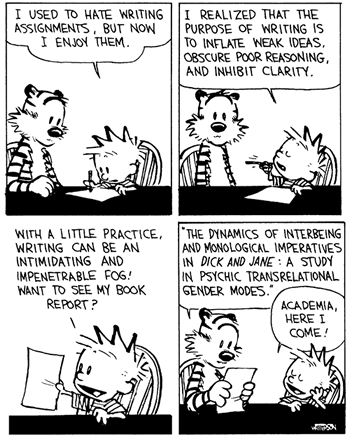There are two ways of constructing a software design: One way is to make it so simple that there are obviously no deficiencies, and the other way is to make it so complicated that there are no obvious deficiencies.
Category: science
The Purpose of Writing

It’s not that exaggerated, indeed. A lot of scientific papers are just blatant mumbo-jumbo, written for the sake of uncommunication, for the sake of piling up academic publications. Worse yet, sometimes scientific writing promises everything and delivers nothing. I’ve just read an article entitled “Deus ex machina”, which promised a review of a current research linking metaphysics and computing, only to discover at the end of my reading that I had been framed: the article provides almost no new information and it fills the page talking about obvious things (remarks in the fashion of: “scientists are working on this interesting combination of fields”, “progress is expected”, “this research may answer important questions”, and pure zilch). That’s why scientific publications have to be handled with care, as you don’t want to waste your time reading void or undecipherable boasting.
In the Name of Science
From ancient times through the 19th century, physicians used bloodletting to treat acne, cancer, diabetes, jaundice, plague, and hundreds of other diseases and ailments (D. Wooton, Doctors Doing Harm since Hippocrates, Oxford Univ. Press, 2006). It was judged most effective to bleed patients while they were sitting upright or standing erect, and blood was often removed until the patient fainted. On 12 December 1799, 67-year-old President George Washington rode his horse in heavy snowfall to inspect his plantation at Mount Vernon. A day later, he was in respiratory distress and his doctors extracted nearly half of his blood over 10 hours, causing anemia and hypotension; he died that night.
Today, we know that bloodletting is unhelpful because in 1828 a Parisian doctor named Pierre Louis did a controlled experiment. He treated 78 people suffering from pneumonia with early and frequent bloodletting or less aggressive measures and found that bloodletting did not help survival rates or recovery times.
